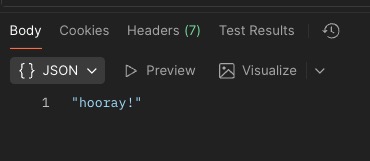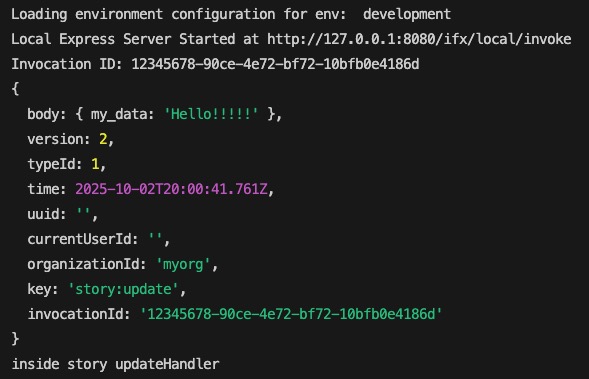Locally Simulate HTTP Requests
This guide will get you familiar with writing code in an integration and invoking that code on your local machine.
Asynchronous events originating from the Event Registry cannot be sent from non-local environments to your local machine. To test locally, you can simulate an event by calling the HTTP endpoint that IFX provides.
Prerequisites
- You have an integration set up locally with a handler prepared to receive events. If you do not, Creating Handlers to Receive Events with IFX will walk you through it.
Run a local server
To spin up a local server where local code can be tested, issue the command npm run localTestingServer
When the server has started successfully, it will look like this:
> @myorg/myorg-my-ifx-integration@1.0.0 localTestingServer> node node_modules/@arcxp/arcxp-ifx-node-sdk/localTestingServer
Loading environment configuration for env: developmentLocal Express Server Started at http://127.0.0.1:8080/ifx/local/invokehttp://127.0.0.1:8080/ifx/local/invoke can now be used to POST event messages to and invoke integrations locally.
Event payload model
All events, except for custom events, will have the same fundemental structure:
{ "organizationId": "string", "key": "string", "typeId": "int", "uuid": "string", "currentUserId": "string", "version": "int", "invocationId": "string", "body": {"PAYLOAD BODY HERE"}}The body serves as the designated area for event data, and its structure can be customized to meet any specific requirements by the event originating application.
For example, the websked:edition_finalize event will send the following event message:
{ "organizationId": "myorgname", "key": "websked:edition_finalize", "typeId": 1, "uuid": "", "currentUserId": "", "version": 2, "invocationId": "ABCD-123534R4-DAFSDFA-8363", "body": { "type": "edition_finalize", "orgId": "string", "publication": { "name": "string", "publicationId": "string", "editionId": "string", "editionTime": "number", "editionUrl": "string", "storyIds": [ "string" ], "sectionId": "string", "website": "string", "publicationSetId?": "string" } }}Test it out
Let’s take a very simple (made up) event message so we can see it working:
-
Navigate to the integration directory where you have a handler ready to go. You can have something as simple as:
src/eventsHandlers/updateHandler.js const updateHandler = async (event) => {console.log(event)console.log("inside story updateHandler")return "hooray!"}module.exports = updateHandlerMake sure you included the event name and handler in
src/eventsRouter.json:{"updateHandler": ["story:update"]} -
Start local server
npm run localTestingServer -
Use Postman (or cURL) to POST a payload to the local server
POST http://127.0.0.1:8080/ifx/local/invoke/and include the JSON below as the POST body:{"organizationId": "myorg","key": "story:update","version": 2,"invocationId": "12345678-90ce-4e72-bf72-10bfb0e4186d","body": {"my_data": "Hello!!!!!"}}In the Postman console we can see the return message from our handler code:

and back in our code editor, the result of
console.log(event):
How to get a “real” payload model
Each application that send events to IFX defines its own payload inside of the event.body, such as Composer's Send to Print event.
You can get the payload model of events you are trying to simulate from the Event Menu. In cases where the payload is not provided:
- Create test event handlers for each event you are researching so you can console log the event payload
- Map those events to the handler
- Ensure useful logging is in place i.e.
console.log(event) - Bundle, deploy and promote the integration to Sandbox
- Trigger the event you need by performing an action, such as updating a story
- Query the logs to view the payload
Save the payload so you can easily adjust minor data points locally, like the headline, to generate new scenarios.
Have a feature request or suggestion? Let us know on Our Ideas Portal.

